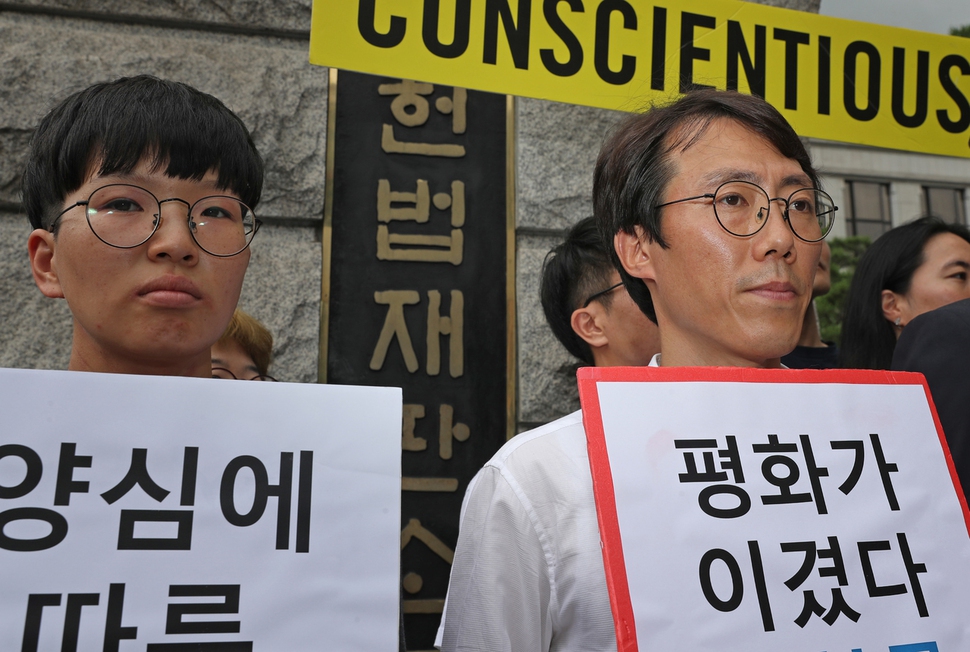 |
|
Demonstrators call for alternative methods of service for conscientious objectors outside the Constitutional Court in Seoul on June 28. (Kim Jinsu, staff photographer)
|
Unusual practice indicates legal shift after June 28 Constitutional Court ruling
The Supreme Court invoked its authority to grant the release of a conscientious objector to military service placed in court custody in his second trial, it was confirmed on July 10. With the Supreme Court scheduled to hold open arguments on Aug. 30 on the punishment of those refusing military service on grounds of religious convictions or conscience, many are watching for a possible change in the court’s ruling on the issue. The Supreme Court’s first division, headed by Justice Park Jung-hwa, invoked its authority on July 6 to grant the release of “K,” a 23-year-old placed in court custody after being sentenced to 18 months in prison in his first trial for refusing military service on religious grounds. K was the only one of 205 defendants in conscientious objection cases pending in the Supreme Court to have been placed in a detention center. “There has been a Constitutional Court decision, and with open arguments coming up, [the court] determined it would be best if he were to be tried without detention like the other defendants in similar cases,” a Supreme Court official explained. It is considered unusual for the Supreme Court to exercise its authority to grant the release of a defendant who has been placed under detention as a conscious object to military service and still has some time (six months) remaining on his period of detention while being tried. Indeed, K himself did not request his release. The Supreme Court has refused applications for release by conscientious objectors in the past. “In regular cases as well, there are almost no cases where the Supreme Court has granted a release other than when [a defendant] is found not guilty, so it’s quite significant that it exercised its authority to permit the release of a detained conscientious objector,” said attorney Baek Jong-geon. “I look forward to seeing a change in precedent at the upcoming Supreme Court en banc hearing,” Baek said. Winds of change have been blowing all around recently, with the Military Manpower Administration (MMA) deferring induction of conscientious objectors after a June 28 Constitutional Court ruling concluding that Military Service Act provisions failing to specify alternative means of service for conscientious objectors were not in accord with the Constitution. While the act’s Article 88-1 on the punishment of military service evaders was deemed constitutional, six of the Constitutional Court justices opposed court punishments of conscientious objectors – raising the likelihood of a change in Supreme Court precedents. Since the 2000s, courts have adopted a “one size fits all” approach to conscientious objectors, uniformly assigning the eighteen-month prison sentences that serve as a minimum for having active service waived. In K’s first trial, chief judge Kim Choon-su of the first criminal division on Daejeon District Court’s Seosan branch handed down an eighteen-month prison sentence in Sept. 2017. In his second trial on Apr. 25, K’s appeal was dismissed by judge Shim Joon-bo of Daejeon District Court’s first criminal division, who had him taken into court custody. By Kim Min-kyoung, staff writer Please direct comments or questions to [english@hani.co.kr]






